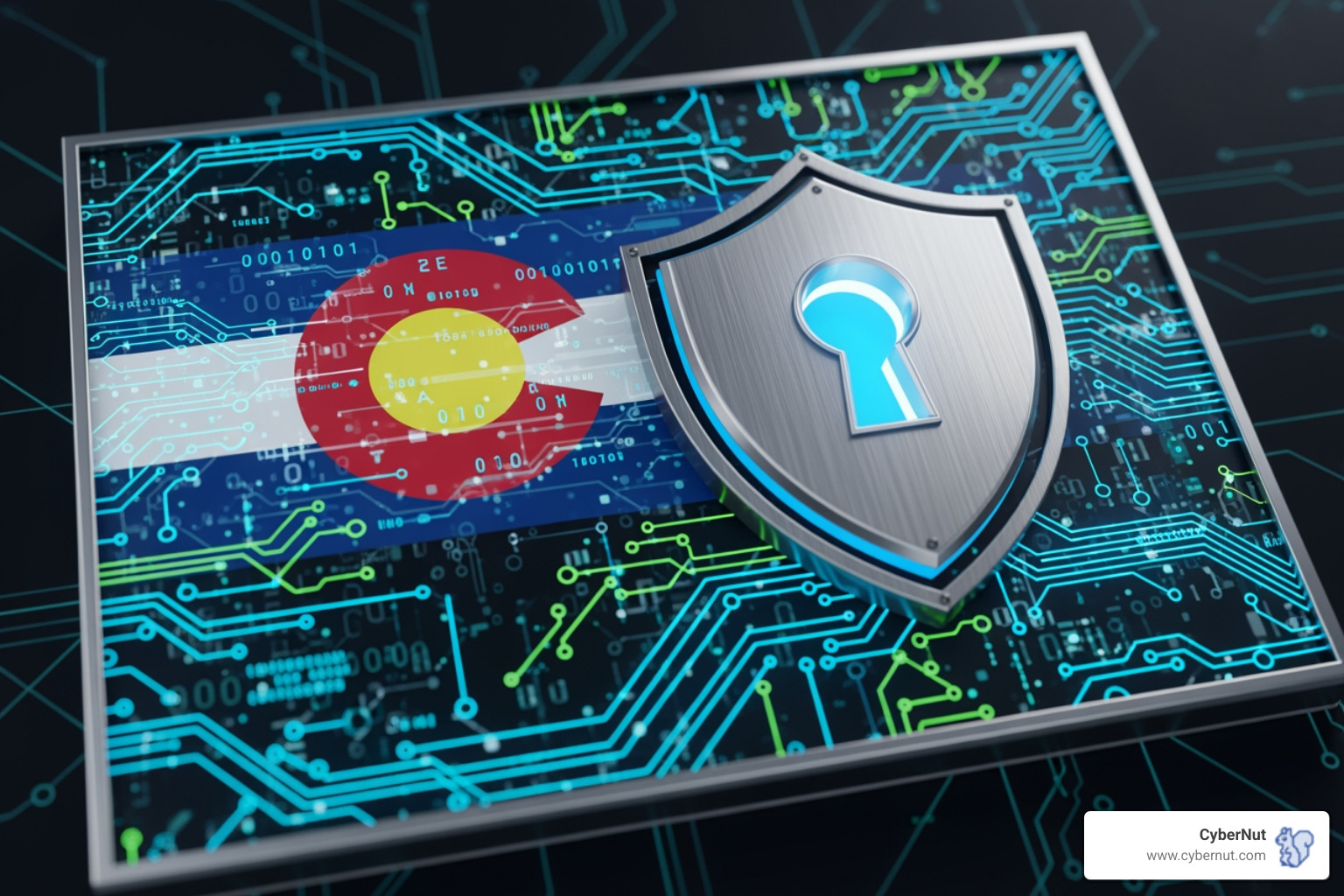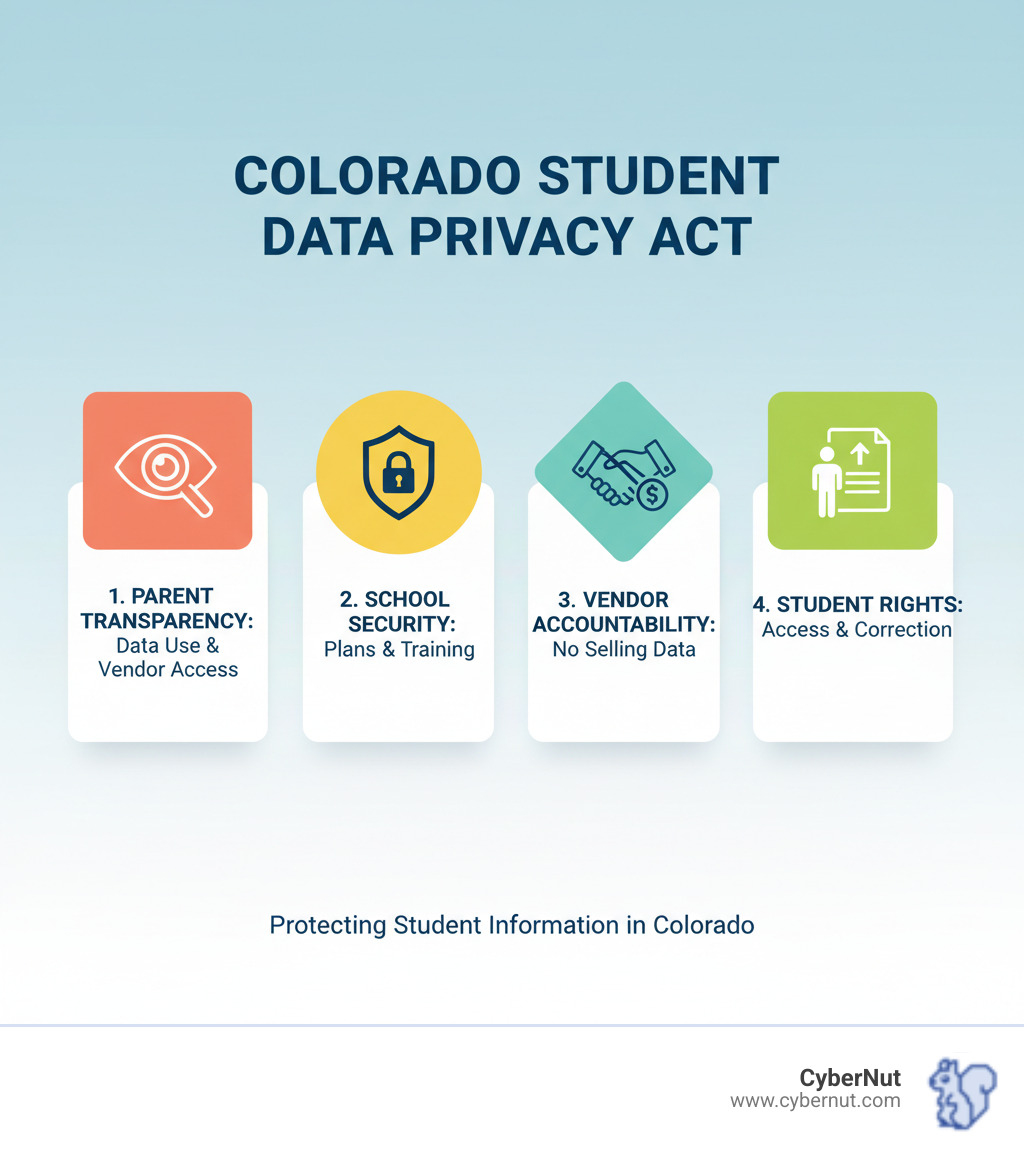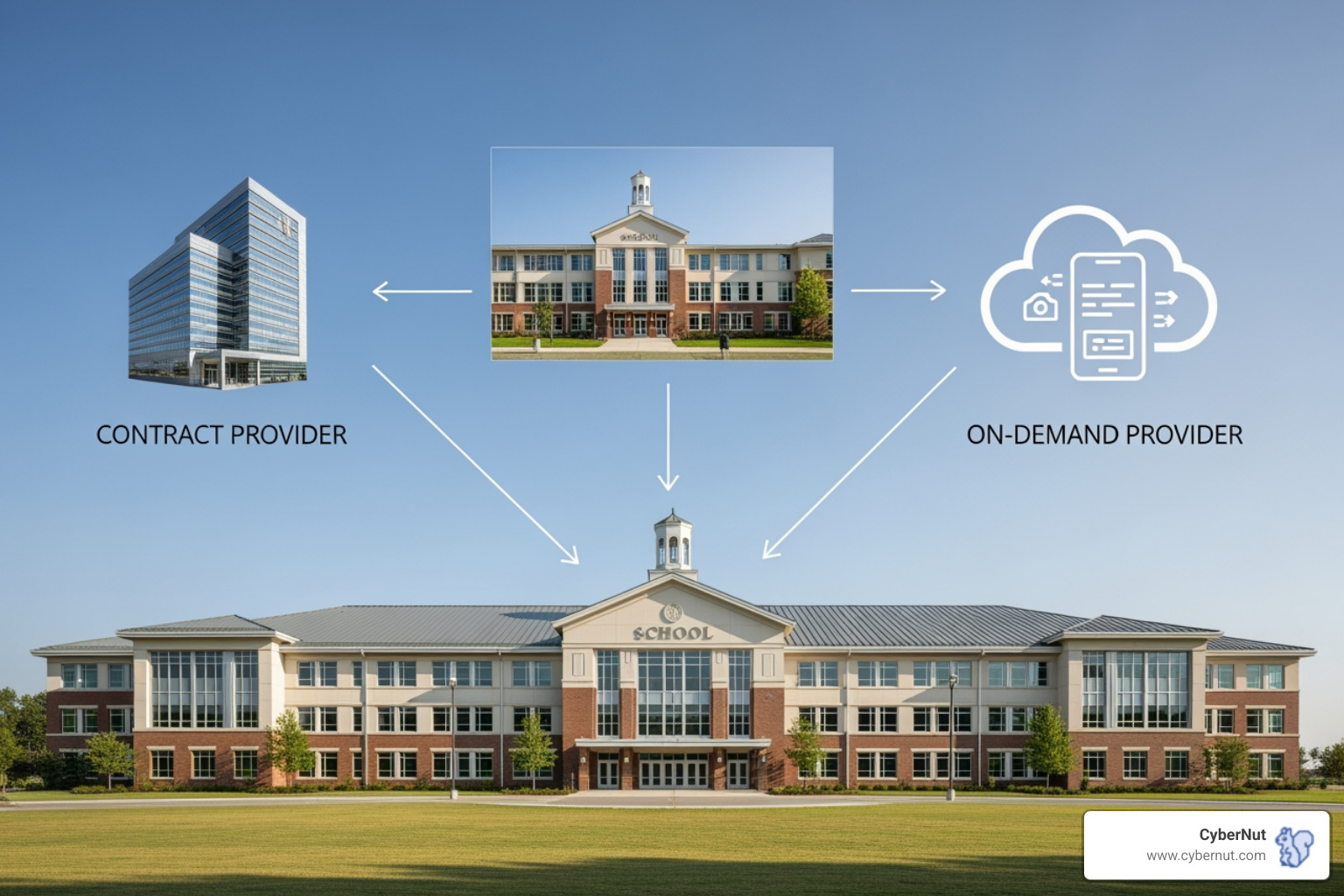
Oliver Page
Case study
November 6, 2025

All About Colorado's Student Data Transparency and Security Act starts with a simple fact: schools collect massive amounts of student information, and Colorado decided this data needed serious protection. In 2016, the state passed House Bill 16-1423, known as the Student Data Transparency and Security Act, to address growing concerns about how K-12 schools handle student personally identifiable information (SPII).
Quick Overview: What You Need to Know
As one legal analysis noted, "The recognized trend in data privacy is that those collecting or storing personally identifying information (“PII”) are required to safeguard and protect that information." Colorado's Act goes further than many states, creating one of the strictest student privacy frameworks in the country.
The law tackles a real challenge. Schools now use dozens of online platforms, apps, and services. Each one potentially collects student data. Before this Act, Colorado law wasn't clear about how schools should handle this information or hold vendors accountable. Parents had limited visibility into what data was collected or who could access it.
The Act changed that landscape completely. It requires schools to be transparent about data collection, implement security measures, vet their vendors carefully, and give parents real rights over their children's information.

Simple All About Colorado’s Student Data Transparency and Security Act word guide:
If you work for a Colorado public school, charter school, or BOCES (Board of Cooperative Educational Services), the Colorado Student Data Transparency and Security Act applies directly to you. The law calls these entities Local Education Providers, or LEPs, and it sets clear expectations for how you handle student information.
The timeline was straightforward but generous. After the Act became effective on August 10, 2016, most districts had until December 31, 2017, to adopt their required policies. Smaller rural districts—those with fewer than 1,000 students enrolled in K-12—got extra breathing room until July 1, 2018.
These requirements aren't just bureaucratic boxes to check. They're about building trust with families and protecting the students in your care. A solid Data Security and Privacy Plan becomes the foundation of that protection.

Transparency sits at the core of All About Colorado's Student Data Transparency and Security Act. The law requires LEPs to open their books, so to speak, making their data practices visible to everyone who cares to look.
Your district needs a comprehensive student information privacy and protection policy that covers the full landscape of data handling. This means spelling out your privacy compliance standards, explaining how long you keep student data and how you destroy it when it's no longer needed, documenting what student PII you collect and who you share it with, outlining what happens if there's a security breach, and describing how you train staff on these critical issues.
This isn't a one-and-done document. You must review it annually and update it as technology evolves. Data practices that made sense three years ago might be completely outdated today.
The public posting requirements take transparency even further. Your school website becomes the information hub where parents can find everything they need to know about student data. You'll need to post the specific data elements of student PII that your LEP collects and maintains (excluding what gets sent to the Colorado Department of Education). Parents should be able to see exactly how you use and share that information.
You'll also post a direct link to the State Board of Education's index of data elements and definitions, making it easy for families to understand the technical details. The complete list of all your school service contract providers goes up too, along with copies of each contract. For each provider, you'll detail what data elements they collect, what learning purposes they use the data for, and how they use and share student PII.
The requirements also cover on-demand providers—those quick-signup services that teachers might use. You'll list all the on-demand providers your LEP or employees use. Critically, if you stop using a provider because they violated your privacy policy or the Act, that goes on the list too, along with any written response from the provider. This creates real accountability.
Finally, your current student information privacy and protection policy gets posted where everyone can find it. This level of detail means a parent can sit down at their computer and find exactly what data their child's school collects and who has access to it.
Essential elements your policy should address include clear definitions of student PII and educational records, procedures for collecting and disclosing information, protocols for obtaining parental consent when required, robust security measures like access controls and encryption, breach response plans with notification procedures, data retention guidelines and secure destruction methods, requirements for vetting third-party vendors, annual staff training mandates, processes for parents to inspect and request changes to records, and a formal complaint process for alleged violations.
Understanding what counts as Student Personally Identifiable Information (SPII) is crucial because it defines what the Act protects. Colorado casts a wide net with this definition, going well beyond just names and addresses.
SPII means any information that, alone or in combination, personally identifies an individual student or their family. This includes data collected, maintained, generated, or even inferred by your school or through a service provider. That last part—"inferred"—is significant. Even data points that don't directly name a student might become SPII when combined with other information.
Think about it this way: a student's date of birth and gender might seem harmless on their own. But cross-reference those with other publicly available data, and you might be able to identify exactly who that student is. That's why the definition is intentionally broad.
The obvious examples include the student's name and address, parent or family member names, and Social Security numbers. Medical information like health conditions and immunizations falls under SPII. So does all the academic performance data—assessments, grades, learning activities. Attendance records count. Disciplinary incident details are included. Biometric information qualifies too.
For the complete picture of what data elements the state collects, check out the Data collected by the Colorado Department of Education. Understanding the broader landscape of Sensitive Data Definition and Types helps put Colorado's requirements in context.
There's an important flip side to this definition. The Colorado Department of Education is generally prohibited from collecting certain types of sensitive information unless state or federal law specifically requires it. This includes juvenile delinquency records, criminal records, medical and health records (beyond what's necessary for education), student Social Security numbers, and student biometric information. The state deliberately drew these boundaries to limit collection of the most sensitive data.
Transparency is only half the equation. The Act demands serious security measures to protect all that student information you're collecting and maintaining.
Every LEP needs a detailed Data Security Plan. The State Board of Education developed policies and procedures to guide this work, but each district must implement its own comprehensive approach. This means thinking about student data from cradle to grave—from the moment it's created until the day it's permanently destroyed.
Your security plan needs to address access authorization and authentication—controlling who can see student data and verifying their identity before granting access. It must include privacy compliance standards that align with the Act's requirements and regular privacy and security audits to verify your safeguards are actually working.
You need a security breach plan ready to go before a breach happens. This includes clear procedures for notifying affected parties quickly. Your plan should specify how long you retain student PII and exactly how you'll destroy it when retention periods expire. Staff need guidance on appropriate PII use, and everyone should understand the consequences for misusing data.
Perhaps most importantly, your plan must include comprehensive and ongoing staff training for everyone who handles student data. We know from experience that How Hackers Outsmart Schools: What Cybercriminals Know That You Don't—the threat landscape constantly evolves, making continuous training essential.
When it comes to data retention and destruction, your policies need to specify clear criteria for determining when data is no longer needed. Then you need secure methods for disposing of it. Old, unnecessary data sitting in forgotten databases isn't just clutter—it's a liability waiting to happen. Secure destruction ensures that when data has served its purpose, it's gone for good.
Curious how vulnerable your district might be to the most common attack vector? Consider requesting a free phishing audit to see where your staff stands on recognizing threats before they become breaches.
Your school might have the best data privacy policies in the world, but they won't mean much if a third-party app vendor has a security hole you could drive a truck through. The All About Colorado's Student Data Transparency and Security Act recognizes this reality and puts serious accountability measures on the external companies and platforms that schools use every day.
Think about it: your district probably uses dozens of different tools. A student information system. Assessment platforms. Learning management systems. Educational apps. Each one touches student data in some way. Colorado's Act makes sure these vendors play by strict rules.

The Act draws a clear line between two types of service providers, and understanding this distinction is crucial for compliance.
School Service Contract Providers are the vendors your district formally contracts with. These are the big relationships, the platforms you've signed agreements to use across your schools. Maybe it's your district-wide student information system or that subscription-based curriculum platform everyone uses. If it's an online platform designed for K-12 use that collects, maintains, or uses student PII, and you've got a contract for it, it falls into this category.
School Service On-Demand Providers are different. These are the tools that get used without formal district-level contracts. Often they're free or freemium services. A teacher finds a cool educational app and starts using it with their class. That's typically an on-demand provider. They're still providing a school service, but under their standard terms rather than a negotiated contract.
Why does this distinction matter? Because the Act holds each type accountable in different ways.
Defining Contractual Requirements
For contract providers, Colorado doesn't mess around. Every contract must include specific, non-negotiable terms. These aren't suggestions. They're legally binding commitments that protect student data.
Your contracts with these providers must expressly require them to comply with all provisions of the Act. They must safeguard the privacy and security of student PII. The contract needs to spell out exactly what purpose the student data will be used for, and the provider can only use it for that stated purpose. Period.
The contract must prohibit the provider from further disclosing student PII or using it for commercial purposes. And there must be clear penalties written into the contract for when a provider doesn't comply.
Here's the enforcement mechanism that gives these requirements teeth: LEPs cannot enter into or renew contracts with providers who refuse these terms. If a provider has substantially failed to comply with the Act in the past, you can't work with them. It's that simple. Many districts accomplish this through data privacy addendums that spell out these Colorado-specific requirements.
For on-demand providers, the accountability works differently. While there's no formal contract to enforce, LEPs must maintain and publicly post a list of all on-demand providers being used. And if you stop using an on-demand provider because they're not complying with privacy standards, you must publicly post their name and notify the Colorado Department of Education. This creates a public record that other districts can check.
The reality is that Third-Party Data Breaches 101 shows us how vulnerable schools can be through their vendors. Vetting these third parties carefully isn't just good practice. Under Colorado law, it's mandatory.
The Act establishes clear boundaries that vendors absolutely cannot cross. These aren't gray areas. They're bright red lines designed to prevent the commercial exploitation of student data.
What Vendors Cannot Do
First and foremost, vendors cannot sell, trade, gift, or monetize student data in any way. Your students' information is not a commodity. It's not an asset that can be packaged and sold to data brokers or used for commercial gain. This prohibition is absolute.
Targeted advertising is also banned. Service providers cannot use student PII to target ads to individual students. Think about how many companies build detailed profiles of people to serve them personalized ads. That entire model is off-limits when it comes to student data in Colorado. A vendor can't look at a student's reading level or assessment scores and use that information to push products at them.
Similarly, vendors cannot create personal profiles of students for non-educational purposes. Now, using student data to personalize their learning experience is fine. That's actually the point of many educational platforms. But building profiles for other commercial or non-educational purposes crosses the line.
What Happens When Vendors Break the Rules
For contract providers, a material breach involving the misuse or unauthorized release of student PII is serious business. The LEP can immediately terminate the contract. The provider can lose access to student data. And there are potential fines and other legal consequences on the table.
For on-demand providers, the consequences are more reputational but still significant. When an LEP stops using an on-demand provider due to non-compliance, they must post the provider's name on their public website. They also notify the CDE, which then posts the provider's name on the state's website. The provider can submit a written response, which also gets posted, but their name is out there as a non-compliant vendor.
This public notification system creates a powerful incentive for vendors to take Colorado's requirements seriously. No company wants to be on the state's list of providers that schools stopped using due to privacy violations.
The Colorado Department of Education Data Privacy and Security Page serves as the central hub for this information, helping districts make informed decisions about which vendors to trust with student data.
The bottom line? Colorado's approach to vendor accountability recognizes that protecting student data requires more than just good policies at the school level. It requires holding every link in the chain to the same high standards. When you're evaluating a new platform or app for your district, these requirements aren't bureaucratic red tape. They're essential safeguards that ensure student information stays protected, no matter whose systems it touches.
When diving into student data privacy, it's impossible not to mention the granddaddy of them all: the Family Educational Rights and Privacy Act (FERPA). While FERPA provides a federal baseline for student privacy across the U.S., Colorado's Act builds upon it, often providing more specific and stringent protections. Think of FERPA as the foundation, and the All About Colorado's Student Data Transparency and Security Act as a modern, fortified extension designed for today's digital landscape.
The relationship between these two laws is actually pretty straightforward. FERPA has been around since 1974, establishing basic privacy protections for student education records. It's a federal law, so it applies to all schools that receive federal funding. Colorado's Act doesn't replace FERPA; instead, it layers additional requirements on top of it, creating a more comprehensive framework specifically custom to the challenges of digital data in K-12 education.
One of the most significant differences between FERPA and Colorado's Act lies in how they define personally identifiable information. FERPA includes a concept called "directory information" which schools can disclose without parental consent. This typically includes things like a student's name, address, telephone number, date and place of birth, honors and awards, and dates of attendance. Under FERPA, parents can opt out of having this directory information shared.
Colorado's Act takes a stricter approach. Its definition of student PII is broader and doesn't carve out exceptions for directory information. This means Colorado schools need to be more careful about what they share and with whom, even if that information might be considered routine under federal law.
The state-level specificity of Colorado's Act is another key difference. While FERPA sets general guidelines, Colorado's law gets into the nitty-gritty details of how schools should handle data in the digital age. It addresses modern concerns like online platforms, cloud services, and the dozens of educational apps that didn't exist when FERPA was first written.
The vendor requirements are where Colorado really flexes its muscles. FERPA doesn't say much about third-party service providers beyond requiring schools to maintain "direct control" over how those providers use education records. Colorado's Act, on the other hand, mandates specific contract language, prohibits certain uses (like selling data or targeted advertising), and creates a public accountability system for vendors who don't comply. For a deeper understanding of the federal framework, check out All About FERPA: The Federal Student Privacy Law That Still Matters in 2025. You can also find comprehensive information directly from the Family Educational Rights and Privacy Act (FERPA) official page.
Both FERPA and Colorado's Act give parents important rights over their children's information, but Colorado adds extra layers of transparency and access. Under both laws, parents have the right to review PII about their child. This means you can request to see what information the school has collected and is maintaining.
Parents also have the right to request corrections if they believe the information is inaccurate, misleading, or violates their child's privacy rights. If the school refuses to make the requested changes, parents have the right to a formal hearing under both federal and state law.
Where Colorado goes further is in the transparency requirements. Parents can access not just their child's records, but also detailed information about every vendor the school uses. The school's website must post privacy policies for all school service contract providers, along with specifics about what data each vendor collects and how they use it. This means you don't have to wonder who has access to your child's information or what they're doing with it; it's all publicly available.
The process for filing complaints under Colorado's Act is also more robust. If you believe a school or vendor has violated the Act, you can file a complaint with the Colorado Department of Education. The CDE has specific procedures for investigating these complaints and can take action against non-compliant entities. The Information for Parents from the CDE provides helpful guidance on how to exercise these rights.
Colorado's Act also empowers parents through the public posting requirements. When a school stops using a vendor because of privacy violations, that vendor's name gets posted on both the school's website and the CDE's website. This creates a kind of "do not use" list that helps parents and other schools identify problematic vendors. It's accountability in action, giving parents real visibility into how their schools handle these critical relationships.
The combination of FERPA's foundational protections and Colorado's improved requirements creates one of the strongest student privacy frameworks in the country. Parents have more information, more rights, and more recourse than ever before when it comes to protecting their children's data.
Navigating these complex requirements can be challenging for school districts. For expert guidance on ensuring your district is fully compliant and secure, partner with CyberNut. To take the first step in assessing your district's vulnerability to the most common cyber threats, request a free phishing audit and see where your staff stands.

Oliver Page

Some more Insigths


Back